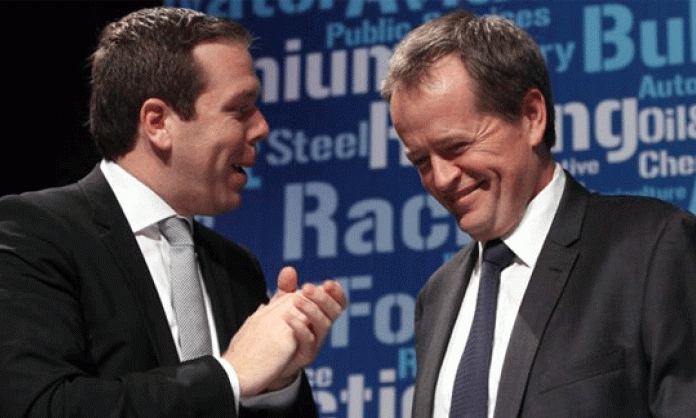“If you want to know how Bill [Shorten] has got to where he is now, if you had to identify one thing, I think it is that he has been prepared to make decisions and to do things that almost anyone else would not.”
– Richard Marles MP, in a 2006 interview with the Sunday Age.
What kind of union would rip off its own members, save the bosses millions and then pocket a few hundred thousand from grateful companies to fund its officials’ political ambitions?
The Australian Workers Union, that’s who, previously led by the current leader of the ALP, Bill Shorten. He was secretary of the Victorian branch from 1998 to 2006 and national secretary from 2001 to 2007.
The AWU has played a predominant and destructive role, in both the union movement and the Labor Party. It is a business union known for sell-out deals and neglect of members. It has done this both to please the bosses and to bolster its factional weight in order to put its top officials aboard the parliamentary gravy train.
While it’s nauseating to listen to dedicated union-destroyers such as Coalition MP Christopher Pyne challenge the opposition leader to answer questions about his role in the AWU – and to see the royal commission’s $80m witch-hunt moving in for the kill – there is no denying that Shorten is a grub and the AWU is corrupt.
It’s telling that not one union is rushing to support the AWU. Instead, despite some hypocritical ranting from Abbott and others, the union’s up-front backing is from Labor parliamentarians, business spokespeople and employers. That’s not surprising; the ruling class has fostered the kind of “yellow unionism” provided by unions like the AWU.
Praised by the bosses, for decades the AWU has played a particularly pernicious role undermining wages and conditions in the construction industry. The current revelations about sell-out deals on Melbourne’s East Link project show that, as Ewin Hannan wrote in the Financial Review on 18 June, “[T]he AWU business model is based on being a safe haven for employers from the CFMEU”.
Tony Shepherd, former Business Council of Australia president, told Hannan: “Bill demonstrated that it could be done in Victoria … It was a great deal for us, it was a great deal for the boys, the safety record was great, there were no disputes, everybody was happy”.
Just what did this “model” agreement actually deliver in the CFMEU’s Victorian stronghold? On the $2.5bn East Link project, it saved the developer, Thiess-John Holland, an estimated $110m and cost it a tiny $300,000 “donation” to the AWU.AWU.
The 2005 deal, described by the CFMEU as “shocking”, offered much lower site allowances and a regime of working around the clock by reducing conditions around rostering and weekend work.
While the developers argue that the pay rates were good by industry standards, big developments such as East Link are usually a chance for the unions to make major advances in wages and conditions. This deal did the opposite, lowering the bar for future EBAs.
According to a Fairfax Media investigation, “The [Thiess-John Holland ] payment was part of more than $1 million of … employer cash flowing into the AWU's Victorian branch between January 2004 and late 2007, when Mr Shorten was either state or federal secretary.
“These include almost $200,000 from cardboard manufacturer Visy industries, which at the time was run by Shorten's billionaire friend Richard Pratt, almost $100,000 from aluminium giant Alcoa, and $300,000 from chemical giant Huntsman.”
At Huntsman, the company paid for an AWU steward to be a “workplace change facilitator” while it closed all its West Footscray plants. Others have described the actual job as “stopping trouble”, delivering no “industrial problems” during the factory closures.
No wonder it has long been known as “Australia’s Worst Union”.
These and other deals make a mockery of Shorten’s claim that he can “guarantee … that we always improved workers’ conditions, full stop” and that “every day … I’ve served the interests of workers”.
At Red Flag we don’t join in the ruling class’s hypocritical denunciation of the AWU. We support rank and file unionists and those officials who have long called for change in the AWU and other right wing unions such as the SDA and the HSU.
And we support the actions of more militant unions such as the CFMEU, which often has had to fight the bosses with one hand and the AWU with the other and which is now under attack from the government and its union-bashing royal commission.









